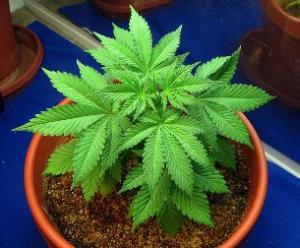A clinical trial underway right now hopes to find the answer -- and more participants.
A powerful Senate committee calls marijuana's Schedule I status an obstacle to research, an Arizona appeals court ruling gets ignored, Oklahoma sees its first medical marijuana clinic, and more.
A Paterson, New Jersey, cop gets ready to pay for going buck wild, a New Mexico state trooper uses stolen drugs to woo women (and girls), a Florida deputy gets nailed for falsely busting people for drugs, and more.
Chuck Schumer files a federal marijuana decriminalization bill, a Delaware pot legalization bill wins a majority, but not a needed supermajority, Health Canada releases legal marijuana regulations, and more.
The US Senate votes to legalize hemp, the State Department gets behind Colombia's plan to reintroduce aerial fumigation of coca crops, an Arizona court rules that hash isn't medical marijuana, and more.
Vermont becomes the 9th legal marijuana state, the DEA gets a new acting administrator, Mexico elects a new president who has new ideas for ending drug war violence, and much, much more.
Democratic legislative leaders in New Hampshire and New Jersey are pushing forward on marijuana legalization, a powerful Senate committee slams marijuana's classification as a Schedule I drug, the Swiss government is moving toward pilot programs on marijuana legalization, and more.
The hunt for a pharmacological agent to help people strung out on cocaine get off the marching powder has been a long one, and non-traditional types of treatments are among the possibilities being studied. Ibogaine is one pharmacological therapy being studied. Another is href="https://www.uab.edu/news/research/item/9565-study-can-taking-a-hallucinogen-curb-cocaine-use" target=_blank_>psilocybin, the chemical that puts the magic in magic mushrooms.
Scientists at the University of Alabama-Birmingham's (UAB) School of Public Health are now conducting a clinical trial to see whether psilocybin can help break cocaine addiction.
The trial currently has almost 20 people enrolled, but researchers are looking for more subjects -- people who are currently using cocaine and have a strong desire to quit.
"Our goal is to create a tool or drug that provides significantly better outcomes for individuals addicted to cocaine than those that currently exist," said Sara Lappan, Ph.D., a postdoctoral scholar in the Department of Health Behavior
In the trial, participants receive a dose of psilocybin and are monitored for six hours, about the duration of the experience. Then, the researchers track his or her cocaine use.
"Our idea is that six hours of being under the effects of psilocybin may be as productive as 10 years of traditional therapy," Lappan said.
The researchers theorize that psilocybin works on three levels: the biochemical, the psychological, and the spiritual. In terms of biochemistry, psilocybin disrupts brain receptors thought to reinforce addictive behaviors. Psychologically, the drug is believed to reduce cravings, increase motivation, and increase one's sense of self-efficacy. Spiritually -- or transcendentally -- psilocybin (along with other psychedelics) is thought to increase both a person's sense of purpose and his or her sense of universal connectedness or oneness.
"If our hypotheses are supported, this has the potential to revolutionize the fields of psychology and psychiatry in terms of how we treat addiction," Lappan said.
But don't run out and start gobbling down magic mushrooms to quit cocaine just yet, the researchers cautioned.
"We aren't advocating for everyone to go out and do it," said Peter Hendricks, Ph.D., associate professor of health behavior in the School of Public Health at UAB. "What we are saying is that this drug, like every other drug, could have appropriate use in a medical setting. We want to see whether it helps treat cocaine use disorder."
They're not the only ones looking into the secrets of psilocybin. UAB is one of a half-dozen universities studying its potential medicinal benefits. The others are Johns Hopkins University, Imperial College London, New York University, University of California-San Francisco and Yale.
This article was produced by Drug Reporter, a project of the Independent Media Institute.
back to top
A powerful Senate committee calls marijuana's Schedule I status an obstacle to research, an Arizona appeals court ruling gets ignored, Oklahoma sees its first medical marijuana clinic, and more.
National
Senate Committee Slams Marijuana's Federal Classification, Saying Schedule I Blocks Research. The Senate Appropriations Committee has issued a report criticizing marijuana's continued classification as Schedule I drug, saying that the classification is a bar to research. "The Committee is concerned that restrictions associated with Schedule 1 of the Controlled Substance Act effectively limit the amount and type of research that can be conducted on certain Schedule 1 drugs, especially marijuana or its component chemicals and certain synthetic drugs," the committee wrote a new report called "Barriers to Research."
Arizona
Arizona Appeals Court Rules Patients Face Can Be Arrest For Hashish, Extracts. The state Court of Appeals ruled last Tuesday that medical marijuana patients can still be arrested for possessing hashish or extracts because they weren't included by name in the voter-approved medical marijuana initiative in 2010. The ruling came in the case of card-carrying patient Rodney Jones, who was caught with 0.05 ounces of hash. After spending more than a year in jail, he waived his right to a jury trial, but not his right to appeal. "If the drafters wanted to immunize the possession of hashish they should have said so," the ruling said. "We cannot conclude that Arizona voters intended to do so." Arizona Attorneys for Criminal Justice, which is supporting Jones, said the ruling will be appealed to the state Supreme Court.
Arizona Marijuana Industry Leaders Say They Will Ignore Appeals Court Ruling Barring Extracts. Last week's state appeals court ruling that because hashish and marijuana extracts were not explicitly mentioned in the state's medical marijuana law they are illegal is being met with vows to ignore it by the industry. Dispensary associations and operators say they will wait for a final ruling from the state Supreme Court before complying. That could leave them open to criminal prosecution, even though the state Department of Health Services said last Friday it is still trying to figure out what to do.
Oklahoma
Oklahoma Sees First Medical Marijuana Clinic. That didn't take long. Just hours after the polls closed last Tuesday and voters approved a medical marijuana initiative, the Tulsa Higher Care Clinic opened for business. The clinic provides doctors who will write medical marijuana recommendations, but it isn't selling any product… yet.
Oklahoma Governor Says No Special Session for Medical Marijuana. Despite saying before the June 26 election that the successful medical marijuana initiative would require a legislative special session to be implemented, Gov. Mary Fallin (R) said last Friday that she and House and Senate leaders have decided that a special session isn't necessary. Instead, the Health Department will be charged with promulgating emergency rules.
Utah
Utah Medical Marijuana Initiative Foes Seek Emergency Restraining Order to Block it from Ballot. The Coalition for a Safe and Healthy Utah, which includes the Utah Medical Association, the Eagle Forum, the Utah Police Chiefs Association and other law enforcement groups, last Friday asked US District Court Judge Clark Waddoups to issue an emergency injunction. They argued marijuana remains illegal under federal and state law. But the state attorney general's office opposes the injunction. "There is no emergency," argued Assistant Utah Attorney General David Wolf. "The election is months away, and the voters may reject the Initiative and moot the constitutional issues that, in Plaintiffs' view, justify an emergency (preliminary) injunction."
Utah Medical Marijuana Foes Drop Lawsuit Seeking to Block Initiative. Drug Safe Utah, which had sought to block the medical marijuana initiative from appearing on the November ballot, has given up on that tactic. An attorney for the group said its challenge lacked "ripeness," in that it sought to block the law before voters had a chance to vote on it. The attorney said the group may try to challenge it after it passes.
[For extensive information about the medical marijuana debate, presented in a neutral format, visit MedicalMarijuana.ProCon.org.]
back to top
A Paterson, New Jersey, cop gets ready to pay for going buck wild, a New Mexico state trooper uses stolen drugs to woo women (and girls), a Florida deputy gets nailed for falsely busting people for drugs, and more. Let's get to it:
In Bunker Hill, Indiana,
a state prison guard was arrested last Friday after she got caught smuggling suboxone and methamphetamine into the Miami Correctional Facility. Officer Talleigha Titus went down after being tripped up by surveillance of inmate phone and payment records. She is charged with attempting to traffic, possession of methamphetamine and possession of a controlled substance.
In Farmington, New Mexico, a state trooper was arrested last Saturday for stealing drugs during arrests and giving them to women with whom he was romantically interested, including a 16-year-old girl. Officer Daniel Capehart went down after a meth user told investigators Capehart had been texting her for months and they set up a sting where he offered to split drugs with her from any bust she set up. In the case of the teen, Capehart sent numerous texts to set up deliveries of marijuana, but the teen had handed her phone over to the cops, and he was actually communicating with a San Juan County sheriff's detective. He is charged with distribution of methamphetamine and marijuana.
In Fernandina Beach, Florida, a Nassau County sheriff's deputy was arrested last Saturday for not testing drugs found in the field and making false claims that some drugs were illegal. Deputy Kyle Tholl, 38, is now a former deputy. Tholl repeatedly pulled people over for traffic violations and charged them with drug possession when the drugs were either prescribed over the counter medications. He is charged with perjury and filing a false police report. Some 30 of his drug cases have now been dropped.
In Paterson, New Jersey, a former Paterson police officer pleaded guilty last Wednesday to stealing drugs, dealing drugs from his squad car, and beating up a wheelchair-bound hospital patient. Ruben McAusland, 26, went down in April in a federal probe. He admitted in federal court to dealing heroin, cocaine, crack, and marijuana from his squad car while in uniform, as well as the unprovoked attack on the hospital patient, which he and his partner videotaped. He copped to drug possession with an intent to distribute and deprivation of civil rights under color of law. McAusland will be facing up to 50 years in prison when he gets sentenced on Oct. 9. The ex-cop must also forfeit $13,650 -- the amount of money he made on drug deals.
In Great Falls, Montana, a Fort Peck tribal police officer was sentenced last Thursday to a year and a day in prison for stealing drugs and money from the tribe's drug investigation office. Mikkel Shields, 33, had previously pleaded guilty to burglary in the case, which compromised more than two dozen drug cases. In September, he broke into the Fort Peck Tribal Law and Justice Building and used a crowbar to get into the drug investigations office, where he took opiates, methamphetamine and cash. He had been diagnosed with PTSD after serving in the military and had undergone substance abuse treatment, but relapsed in August.
back to top
Chuck Schumer files a federal marijuana decriminalization bill, a Delaware legalization bill wins a majority but not the needed supermajority, Health Canada releases legal marijuana regulations, and more.

Senate Minority Leader Chuck Schumer (D-NY) files a bill to federally decriminalize marijuana. (Flickr/DonkeyHotay)
Senate Democratic Leader Introduces Bill to Decriminalize Marijuana at the Federal Level. Sen. Chuck Schumer (D-NY) on Wednesday introduced legislation that would decriminalize and de-schedule marijuana at the federal level by removing it from the Controlled Substances Act. The bill would also take some initial steps toward reducing the decades-long damage of marijuana criminalization. One provision would provide $20 million annually for state and local programs to expunge or seal the criminal records of people convicted of marijuana possession. It also creates a small business trust fund at the federal level (based on a fraction of the money generated by the marijuana industry) to give loans to small businesses owned by women and socially and economically disadvantaged individuals.
Arizona Poll Has Narrow Majority for Legalization. A new Emerson College poll of Arizona voters has support for marijuana legalization at 53%, with 39% opposed. The poll noted that the group most split on the issue was Hispanic voters, with 45% in support and 44% opposed.
Majority of Delaware Lawmakers Approve Marijuana Legalization Bill, But It Fails. A bill that would legalize marijuana, House Bill 110, won a majority of votes in the House on Wednesday, but failed to advance because it needed the votes of at least 60% of representatives, and fell four votes short. The bill needed a supermajority because it contained provisions dealing with taxes and fees.
Las Vegas Will Try Again to Legalize Marijuana Lounges. The city of Las Vegas is again looking at ways of allowing social use venues for marijuana. The city held a public workshop Wednesday to discuss a draft ordinance to allow for such public use. Officials said the earliest the city council might vote on the issue is about three months from now.
International
Health Canada Rolls Out Legal Marijuana Regulations. Health Canada has released some 400 pages of regulations for the country's about-to-emerge legal marijuana industry. Among the highlights, criminal records won't necessarily bar employment in the industry; there will be subclasses of licenses for micro, standard, and nursery cultivation; pre-rolled joints will be limited to one gram of weed; and strict branding and packaging regulations.
back to top
The US Senate votes to legalize hemp, the State Department gets behind Colombia's plan to reintroduce aerial fumigation of coca crops, an Arizona court rules that hash isn't medical marijuana, and more.

The Trump administration is down with dumping herbicides on the heads of these Colombian coca farmers. (DEA)
Arizona Appeals Court Rules Patients Face Can Be Arrest For Hashish. The state Court of Appeals ruled Tuesday that medical marijuana patients can still be arrested for possessing hashish because it wasn't included by name in the voter-approved medical marijuana initiative in 2010. The ruling came in the case of card-carrying patient Rodney Jones, who was caught with 0.05 ounces of hash. After spending more than a year in jail, he waived his right to a jury trial, but not his right to appeal. "If the drafters wanted to immunize the possession of hashish they should have said so," the ruling said. "We cannot conclude that Arizona voters intended to do so." Arizona Attorneys for Criminal Justice, which is supporting Jones, said the ruling will be appealed to the state Supreme Court.
Oklahoma Sees First Medical Marijuana Clinic. That didn't take long. Just hours after the polls closed Tuesday and voters approved a medical marijuana initiative, the Tulsa Higher Care Clinic opened for business. The clinic provides doctors who will write medical marijuana recommendations, but it isn't selling any product… yet.
Hemp
US Senate Votes to Legalize Hemp. The Senate passed the omnibus Farm Bill Thursday, and that bill includes an amendment from Senate Majority Leader Mitch McConnell (R-KY) that legalizes the cultivation, processing, and sale of hemp. For years, the DEA has refused to recognize hemp as distinct from marijuana, but that distinction will be enshrined in law if the bill is signed into law. "Consumers across America buy hundreds of millions in retail products every year that contain hemp," McConnell said in a floor speech on Thursday. "But due to outdated federal regulations that do not sufficiently distinguish this industrial crop from its illicit cousin, American farmers have been mostly unable to meet that demand themselves. It's left consumers with little choice but to buy imported hemp products from foreign-produced hemp."
Asset Forfeiture
Idaho Civil Asset Forfeiture Reforms Go into Effect on Sunday. Reforms passed by the legislature and signed into law earlier this year go into effect on Sunday. The new law doesn't end civil asset forfeiture but does ban the seizure of vehicles for simple drug possession, requires that a connection is shown between seized property and a crime, and states that simple possession of a large amount of cash isn't grounds for it to be seized. The bill also requires for the first time statewide reporting of civil forfeitures and includes a provision allowing people accused of crimes to retain their property until found guilty.>
Foreign Policy
State Department Supports Resumption of Aerial Coca Eradication in Colombia. The US State Department Thursday expressed its support for resuming aerial coca spraying in Colombia. "The United States believes that all tools must be used to reverse the sharp increase in cocaine production," a department spokesperson said. Aerial fumigation was banned in 2015 because of environmental damage and health concerns for residents of areas being sprayed. Colombia produced a record amount of cocaine last year.
back to top
Vermont becomes the 9th legal marijuana state, the DEA gets a new acting administrator, Mexico elects a new president who has new ideas for ending drug war violence, and much, much more.

You can now legally grow your own marijuana in Vermont. (Creative Commons)
Massachusetts Issues First Pot Shop License. The state's Cannabis Control Commission on Monday approved its first license for a retail marijuana outlet. The commission approved a license for Cultivate Holdings to open a retail shop. The shop already exists but has operated as a medical marijuana dispensary up until now.
North Dakota Could Vote on Marijuana Legalization in November. A little-noticed legalization initiative now looks like it may qualify for the November ballot. Organizers with Legalize ND say they have 16,000 raw signatures and are aiming at 20,000 before they turn them in next week. The initiative needs 13,452 valid voter signatures to qualify.
Northern Marianas Islands Legalization Bill Advances. The island US territory's House Committee on Judiciary and Governmental Operations has recommended passage of a marijuana legalization bill, Senate Bill 20-62. Now, the measure awaits a go-ahead from Speaker Ralph Demapan (R) for it to head for a House floor vote.
Vermont Marijuana Legalization Is Now in Effect. As of Monday, it is legal to grow and possess small amounts of marijuana. People 21 and over can possess up to an ounce and two mature and four immature plants. But commercial sales have not been legalized.
Medical Marijuana
Oklahoma Governor Says No Special Session for Medical Marijuana. Despite saying before the June 26 election that the successful medical marijuana initiative would require a legislative special session to be implemented, Gov. Mary Fallin (R) said last Friday that she and House and Senate leaders have decided that a special session isn't necessary. Instead, the Health Department will be charged with promulgating emergency rules.
Utah Medical Marijuana Initiative Foes Seek Emergency Restraining Order to Block it from Ballot. The Coalition for a Safe and Healthy Utah, which includes the Utah Medical Association, the Eagle Forum, the Utah Police Chiefs Association and other law enforcement groups, last Friday asked US District Court Judge Clark Waddoups to issue an emergency injunction. They argued marijuana remains illegal under federal and state law. But the state attorney general's office opposes the injunction. "There is no emergency," argued Assistant Utah Attorney General David Wolf. "The election is months away, and the voters may reject the Initiative and moot the constitutional issues that, in Plaintiffs' view, justify an emergency (preliminary) injunction."
Drug Policy
Acting DEA Head Named. The White House has named Uttam Dhillon as acting DEA administrator. Dhillon is a former career federal prosecutor who has also served in the Department of Justice, the Department of Homeland Security, and the Trump White House.
International
South Australia to Crack Down on Marijuana. Resolutely moving firmly backward, South Australia's Liberal government is moving to crack down on marijuana users as part of a larger drug war offensive. Under a proposal from Attorney-General Vickie Chapman, fines could increase from $500 to $2,000, and users could face up to two years in jail. Another member of the Liberal government, Health Minister Greg Hunt, even resurrected the hoary old "gateway drug" canard. "Marijuana is a gateway drug. The risk of graduating to ice or to heroin from extended marijuana use is real and documented," Hunt said.
Indonesia Taking Softer Line on Drugs?. The National Narcotics Agency and the UN Office on Drugs and Crime (UNODC) announced last week that the country would now push for drug users to be rehabilitated rather than imprisoned. UNODC country manager Collie F. Brown said both institutions agreed that the best way to stop the spreading of drugs is through rehabilitation of drug addicts, rather than sending them to prison. [Ed: Does that mean they're going to stop killing people?]
Luxembourg Approves Medical Marijuana. A bill legalizing medical marijuana passed the parliament on June 28. The bill specifies qualifying conditions including chronic pain, chemotherapy-related nausea and muscle spasm as a result of multiple sclerosis. The marijuana will be imported from Canada and will only be available by prescription from pharmacies located within one of four hospitals in the 98-square mile country.
Mexico Elects President Who Will Likely Try New Approaches to Drug War. Andre Manuel Lopez Obrador (AMLO) was overwhelmingly elected president of Mexico on Sunday. During the campaign, AMLO suggested a willingness to negotiate peace and even offer amnesty to some people in the drug trade. On Sunday night, he talked in the same terms. "The failed strategy of combating insecurity and violence will change," Lopez Obrador said. "More than through the use of force, we will tend to the causes that give rise to insecurity and violence," the president-elect added. He said his team will immediately begin consulting with human rights groups, religious leaders and the United Nations to develop a "plan for reconciliation and peace."
back to top
Democratic legislative leaders in New Hampshire and New Jersey are pushing forward on marijuana legalization, a powerful Senate committee slams marijuana's classification as a Schedule I drug, the Swiss government is moving toward pilot programs on marijuana legalization, and more.
Marijuana Policy
New Hampshire Top Senate Democrat Kicks Off Campaign to Legalize Marijuana. Senate Minority Leader Jeff Woodburn has launched an online petition campaign to pressure Gov. Chris Sununu (R) on marijuana legalization. Sununu has vowed to veto any bill that would do that, but Woodburn said, "We're in the business of listening to what the people want, and we need to get our heads out of the sand and recognize the reality that all of our neighbors are moving towards." The campaign hopes to have 10,000 signatures by October when legalization goes into effect in Canada. Once that happens, New Hampshire will be totally surrounded by states or countries that have freed the weed.
New Jersey House, Senate Democrats Say Legalization is Coming Soon. Gov. Phil Murphy promised that marijuana legalization would happen during his first 100 days in office. It didn't, but state Democratic legislative leaders now say it could happen before Labor Day. Senate President Steve Sweeney (D-Gloucester) says lawmakers are "rounding the corner" on marijuana and is predicting legislation could be passed by the end of August. "I know the speaker and I are committed to getting the marijuana bills done this summer. That's our goal," Sweeney said.
Medical Marijuana
Senate Committee Slams Marijuana's Federal Classification, Saying Schedule I Blocks Research. The Senate Appropriations Committee has issued a report criticizing marijuana's continued classification as Schedule I drug, saying that the classification is a bar to research. "The Committee is concerned that restrictions associated with Schedule 1 of the Controlled Substance Act effectively limit the amount and type of research that can be conducted on certain Schedule 1 drugs, especially marijuana or its component chemicals and certain synthetic drugs," the committee wrote a new report called "Barriers to Research."
Arizona Marijuana Industry Leaders Say They Will Ignore Appeals Court Ruling Barring Extracts. Last week's state appeals court ruling that because hashish and marijuana extracts were not explicitly mentioned in the state's medical marijuana law they are illegal is being met with vows to ignore it by the industry. Dispensary associations and operators say they will wait for a final ruling from the state Supreme Court before complying. That could leave them open to criminal prosecution, even though the state Department of Health Services said last Friday it is still trying to figure out what to do.
Utah Medical Marijuana Foes Drop Lawsuit Seeking to Block Initiative. Drug Safe Utah, which had sought to block the medical marijuana initiative from appearing on the November ballot, has given up on that tactic. An attorney for the group said its challenge lacked "ripeness," in that it sought to block the law before voters had a chance to vote on it. The attorney said the group may try to challenge it after it passes.
International
Switzerland Moves Toward Relaxing Marijuana Laws. The Swiss government said Wednesday it aims to institute pilot studies on ways to relax its marijuana laws. "The scientific pilot studies would be limited and restricted to specific areas," the government said. "Participant numbers would also be limited, and minors would be excluded." The government noted that some 200,000 Swiss use marijuana regularly: "Although current laws forbid its consumption and seek to punish it, this number is not declining. At the same time, the black market is flourishing, and the safety of consumers cannot be guaranteed due to a lack of quality control." Between now and October 25, a consultation on the pilot study proposal will take place.
back to top






